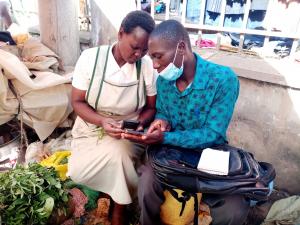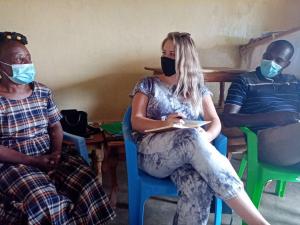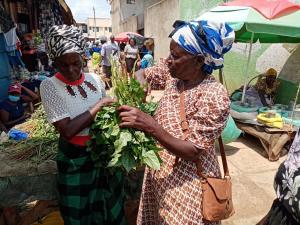AgChain Hackathon in Kenya to Foster Technological Innovation among Youth in the Agriculture Sector
Students will compete for the opportunity to have their applet integrated into the AgUnity SuperApp platform, cash prizes, and mentorship opportunities.
Blockchain is a public, digital, and secure distributed ledger that improves traceability and trust by providing transparency of transactions. There is both optimism and skepticism regarding the technology’s potential for creating benefits among last-mile agricultural communities. In this two-hour webinar, panelists explored the opportunities and conditions needed to realistically assess if blockchain is the right solution to challenges within agricultural and agri-food value chains.
The webinar, hosted by Dr. Ralph Hall – Virginia Tech Associate Professor and Associate Director of the School of Public and International Affairs – featured two panels. One focused on how the characteristics of blockchain are connected to the pain points within agricultural value chains, and the other focused on lessons learned from the USAID-funded Exploring the Use of Blockchain Technology to Improve Food Security Through African Indigenous Vegetables in Western Kenya project.
The AgChain Hackathon is the project’s next event that foster technological innovation among youth in the agriculture sector. From November 15-17, students from Egerton University will “hack” solutions to real challenges within the African indigenous vegetable value chain. AgUnity, Virginia Tech, and Egerton University are providing support and mentoring to students to develop applets that can be deployed on AgUnity’s SuperApp platform. Students will compete for the opportunity to have their applet integrated into the AgUnity suite of service offerings, cash prizes, and mentorship opportunities. Interested observers of the event can check out the livestream here between 8:30am and 5pm EAT. The pitching competition will be held and winners announced on November 17, from 1pm to 5pm EAT.
As a follow-on to these events and to wrap up this project’s period of funding, AgUnity, Virginia Tech, Egerton University, and the Kenya Private Sector Alliance (KEPSA) will host an interactive workshop with members of the agriculture sector in Kenya, entitled Demonstrating the Value-Add of Blockchain in the Kenyan Agricultural Sector. This workshop will allow participants to explore ways to use the AgUnity smartphone application to address pain points within the Kenya agriculture sector through a co-ideation process.
This workshop will also include a matchmaking session for those interested in identifying pathways to scale and sustainability in Kenya. Registration is required for this event. Contact Jessica Agnew, Assistant Director for Research, Operations, and Program Management at the Center for International Research, Education, and Development at Virginia Tech, for more information.
LASER (Long-term Assistance and Services for Research) PULSE (Partners for University-Led Solutions Engine) is a five-year, $70M program funded through USAID’s Innovation, Technology, and Research Hub, that delivers research-driven solutions to field-sourced development challenges in USAID interest countries. A consortium led by Purdue University, with core partners Catholic Relief Services, Indiana University, Makerere University, and the University of Notre Dame, implements the LASER PULSE program through a growing network of 2,500+ researchers and development practitioners in 61 countries.
This publication was made possible through support provided by the Center for Development Research, U.S. Global Development Lab (Lab), U.S. Agency for International Development, through the LASER PULSE Program under the terms of Cooperative Agreement No. 7200AA18CA00009. The opinions expressed herein are those of the author(s) and do not necessarily reflect the views of the U.S. Agency for International Development.
Dr. Jessica Agnew
Virginia Polytechnic Institute and State University
+1 540-385-1227
email us here
Visit us on social media:
Facebook
Twitter
LinkedIn
Other
To Block or Not? Exploring the Use of Blockchain in Last Mile Agriculture Communities
Legal Disclaimer:
EIN Presswire provides this news content "as is" without warranty of any kind. We do not accept any responsibility or liability for the accuracy, content, images, videos, licenses, completeness, legality, or reliability of the information contained in this article. If you have any complaints or copyright issues related to this article, kindly contact the author above.



